必修四Module3 Grammar
外研版高中英语必修4 Module3 Grammar,Listening and Vocabular
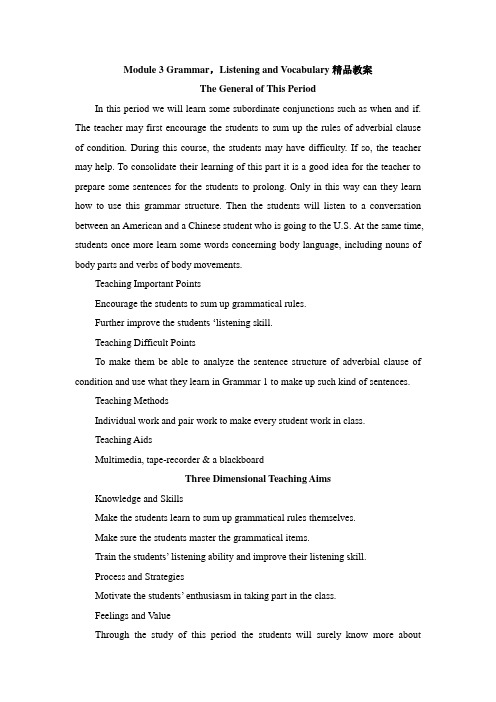
Module 3 Grammar,Listening and Vocabulary精品教案The General of This PeriodIn this period we will learn some subordinate conjunctions such as when and if. The teacher may first encourage the students to sum up the rules of adverbial clause of condition. During this course, the students may have difficulty. If so, the teacher may help. To consolidate their learning of this part it is a good idea for the teacher to prepare some sentences for the students to prolong. Only in this way can they learn how to use this grammar structure. Then the students will listen to a conversation between an American and a Chinese student who is going to the U.S. At the same time, students once more learn some words concerning body language, including nouns of body parts and verbs of body movements.Teaching Important PointsEncourage the students to sum up grammatical rules.Further improve the students ‘listening skill.Teaching Difficult PointsTo make them be able to analyze the sentence structure of adverbial clause of condition and use what they learn in Grammar 1 to make up such kind of sentences.Teaching MethodsIndividual work and pair work to make every student work in class.Teaching AidsMultimedia, tape-recorder & a blackboardThree Dimensional Teaching AimsKnowledge and SkillsMake the students learn to sum up grammatical rules themselves.Make sure the students master the grammatical items.Train the students’ listening ability and improve their listening skill.Process and StrategiesMotivate the students’ enthusias m in taking part in the class.Feelings and ValueThrough the study of this period the students will surely know more aboutadverbial clause of condition and understand the importance of knowing about different customs and culture by listening.Teaching ProceduresStep 1 Revision and lead-in(Greet the students as usual.)The teacher check the students’ homework of yesterday—reciting or retelling the reading passage.(The teacher asks a few students to do this.)Step 2 Grammar 1T:Okay, so much for the check-up. You must have spent much time preparing it and gave good performances just now. During your preparation course, you may take notice of many sentences which are linked by conjunctions when and if, right? Do you know the structures of these sentences? Now follow me to learn them this class. In this period we are going to deal with Grammar 1 and Listening and vocabulary part. First please open your books and turn to Page 23.Look at the following sentences from the passage. Read them and pay attention to the conjunctions when and if. They are used to connect sentences or parts of sentences. Then finish the exercise below.(The teacher gives the students two or more minutes to prepare.)(Two or more minutes later.)T: Have you yet finished it?Ss: Yes.T: Now look at the screen and see if your choices are correct.(The teacher shows the answers on the screen.)Suggested answers:The following statements are true: 1, 3, 4 and 5T:Well done! From the above two sentences and exercise we can get some information about adverbial clause of condition. It describes common situations which were introduced by when and if. Meanwhile, it usually explains the result of the situation in the other part of the sentence and uses the present tense in both parts. If the main clause is located at the beginning of the whole sentence, adverbial clause。
高中英语 外研版 必修四 Module3 Grammar(共22张PPT)

•
- Crazy English
2020/6/3
5
Adverbial clause of condition(条件状语从句)
Conclusion Ⅰ 主将从现(talking about future)
If you come ealier, you will see him tomorrow.
= Come ealier and you __w__i_ll__s_e__e_____ (see) him
引lo导n_g_条_a件_s_,状_ss语_oo_从_lloo_句n_n的g_g_连asa接,s
Youosnhaclol ngdeittaiopnrtizheat_,__o__n__c_o_n__d_i_tion that
providing/provided, if (suppose),
unless (if…not) p_r_o_v_i_d_i_n_g__/ _p_r_ovided
you p时a态ss要th求e :fin主al将ex从am现s.
只要你期末考试通过,你将获得一份奖励。
2020/6/3
8
Adverbial clause of concession(让步状语从句)
Enjoy a song and fill out the blankets.
Right here waiting
如果工作是一种乐趣,生活则是一种享受; 如果工作是一种义务,生活则是一种苦役。
Conclusion Ⅱ 主现从现(talking about situations or habits)
when也可以用来表示条件意味=if
2020/_g_ as
Conclusion Ⅲ 词常见的有:as
人教高中英语必修4Unit3Grammar(共21张PPT)

V-ING 形式做定语 (用于名词前后)
1.V-ING 形式做定语(1)— ADJ.
判断标志(名词前/后): 一般修饰“物”,译为“令人…..的” = 一个
定从
如: a frightening story 一个令人害怕的故事
Her hobby is swimming.
Swimming is her hobby.
区分
She is swimming. 现在进行时
2. My job is teaching (teach) you English.
Teaching you English is my job.
V-ING 形式做表语—等于一个ADJ.
V-ING 形式做宾语补足语 (用在宾语之后,补充说明宾语)
V-ING 形式做宾语补足语
判断标志: 宾语之后,动作正在进行,与宾语呈主动关系
1. I saw a boy getting on the bus.
主动关系,动作正在进行
2. I saw a boy get on the bus.
主动关系,全过程
(smile, expression, look 属于人类情感的用-ed 修饰)
2.V-ING 形式做定语(2)—说明用途/属性
判断标志: V-ing + n. = n. for doing
swimming pool = a pool for swimming
1. drinking (drink) water 饮用水 = water for drinking
= a thief who is caught by a policeman
必修4 Unit3 Grammar 现在分词作定语和宾补

A 5.They knew her well. They had seen her ___ up from childhood. A. grow B. grew C. was growing D. to grow B 6. We will make it ___to all ___ she is a new teacher. A.knowing, that C. known, who B. known, that D. knowing,
C. to be woven D. to have woven 9. There’re 5 pairs___, but I’m at a loss which to buy. B A.to be chosen B. to choose from C. to chose D. chosen 10.He is a man hard ___ with. C A.deal B. to be dealt C. to deal D. dealing
二、-ing形式作宾语补足语 1. 1) 动词-ing形式作宾语补足语常放在宾语后面, 表示一个正在进行的主动性的动作,强调一个过程 或一种状态。如: When we returned to the school, we found a stranger standing at the entrance. 当我们回到学校时, 发现一个陌生人站在大门口。 I found a bag lying on the ground. 我发现地板上放着一个包。 The boss kept the workers working the whole night.
三、-ing形式作表语 -ing形式作表语时放在系动词之后,用来泛指某 种动作或行为,以说明主语的身份、性质或情况。 如: Her hobby is painting. 她的业余爱好是画画。 My job is looking after the children. 我的工作就是照顾这些孩子。 His concern for his mother is most touching. 他对母亲的关爱很感人。
外研版高中英语必修4 Module3 Grammar精品课件

D.so that
解析:选 C 。句意:他准备好了相机,万一看见能拍
一张好照片的东西(就可以拍下来了)。结合句意可知应
选in case,“以防,万一”。even if “即使”;if only“要
brings value to the ቤተ መጻሕፍቲ ባይዱife of others.
A.so that
B.no matter how
C.as long as
D.except that
解析:选 C 。考查连词。句意:只要一个人给别人的
生活带来价值,那么他的生命就有价值。as long as意为
“只要”,符合句意。so that意为“以便,结果”;no
Grammar
条Zx.xk件状语从句和让步状语 从句
一、条件状语从句 条件状语从句是表示主句动作发生的前提或条件的
从句。 1.条件状语从句中的时态
条件状语从句中主句和从句之间的时态要保持一致。 (1)当主句和从句的谓语动词都是单纯陈述过去的事情时,
主句和从句都可用一般过去时。 If it rained, I went to work by taxi. 如果天下雨,我坐出租车去上班。
2.if和unless引导条件状语从句 if表示正向条件,意为“如果”;unless表示反向条件,意为 “除非,如果不”。 If you ask him, he will help you. 如果你请求他,他会帮助你。
You will fail to arrive there in time unless you start earlier. 如果你不早点动身,你就不能及时赶到那儿。 [点津] ①if引导的条件状语从句既可以表示真实条件,又 可以表示与事实相悖或实现的可能性不大的非真实条件(虚 拟语气)。
英语外研版必修4课时作业 Module 3 Section Ⅲ Grammar
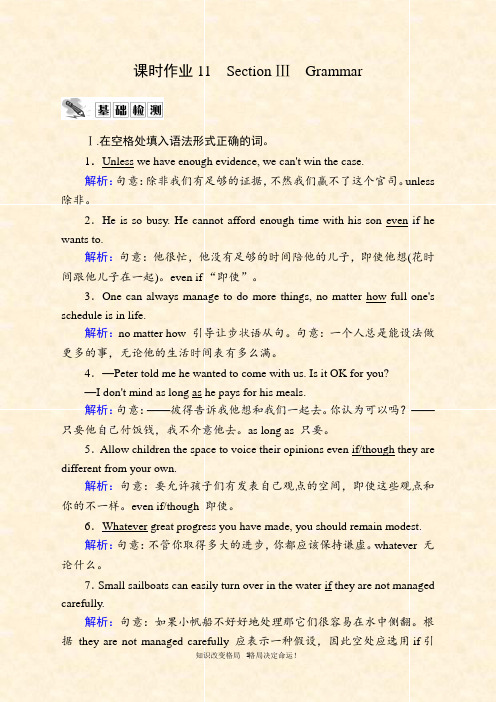
课时作业11Section ⅢGrammarⅠ.在空格处填入语法形式正确的词。
1.Unless we have enough evidence, we can't win the case.解析:句意:除非我们有足够的证据,不然我们赢不了这个官司。
unless 除非。
2.He is so busy. He cannot afford enough time with his son even if he wants to.解析:句意:他很忙,他没有足够的时间陪他的儿子,即使他想(花时间跟他儿子在一起)。
even if “即使”。
3.One can always manage to do more things, no matter how full one's schedule is in life.解析:no matter how 引导让步状语从句。
句意:一个人总是能设法做更多的事,无论他的生活时间表有多么满。
4.—Peter told me he wanted to come with us. Is it OK for you?—I don't mind as long as he pays for his meals.解析:句意:——彼得告诉我他想和我们一起去。
你认为可以吗?——只要他自己付饭钱,我不介意他去。
as long as 只要。
5.Allow children the space to voice their opinions even if/though they are different from your own.解析:句意:要允许孩子们有发表自己观点的空间,即使这些观点和你的不一样。
even if/though 即使。
6.Whatever great progress you have made, you should remain modest.解析:句意:不管你取得多大的进步,你都应该保持谦虚。
外研版高中英语必修四课件Module 3 grammar

____ But for the rain, we should have a
pleasant journey.
Grammar 1 – 3 Match the two parts of these sentences about body language in Europe or Amrica.
3. The volleyball match will be put off if
it ____B____.
A. will rain
B. rains
Байду номын сангаас
C. rained
D. is raining
4. — Shall Brown come and play computer games? — No,___C_____ he has finished his homework. A. when B. if C. unless D. once
The sentences from the passage… 1. describe common situations. 2. describe impossible situations. 3. use if or when to introduce the situation. 4. explain the result of the situation in the other part of the sentence. 5. use the present simple tense in both parts of the sentence.
up half an hour earlier.
_____ 3. As long as you work hard, you’ll
高中英语 Module 3 (第2课时)Grammar 外研版必修4
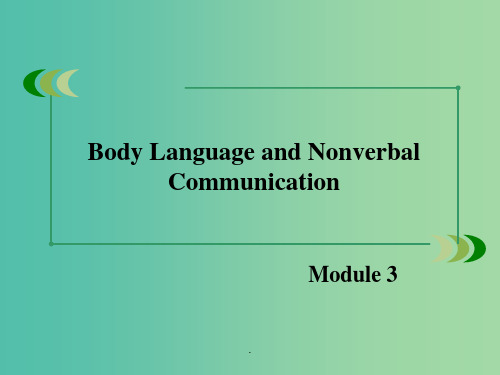
• He wiped his glasses clean with a piece of cloth.
• 他用一块布把眼镜擦干净了。
• I wiped my shoes on the mat before I came in.
• 我在进门前把鞋在垫子. 上擦了擦。
• 知识拓展 • wipe构成的常用搭配: • wipe...away擦净;擦掉 • She wiped her tears away. • 她擦掉了眼泪。 • wipe...from/off...擦净;擦掉 • The teacher asked Tom to wipe the writing
.
n(that)it________,________we continue
• ④________ ________I forget,please remind me about it.
• 万一我忘记了,请提醒我一下。 • ⑤________he was worn out,(still)he kept
.
课内合作探究
.
• 1.stare vi.凝视;盯着看 • She was staring into the distance. • 她凝视着远方。 • The man in the corner was staring at the young lady with a bag. • 在拐角处的那位男士一直盯着拿包的那位 年轻女士。
Body Language and Nonverbal Communication
Module 3
.
第二课时 Grammar
Modu合作探究
4 基础巩固
3 新课标语法
5 课后强化作业
人教高中英语必修4Unit3 Grammar (共19张PPT)

ing form的复合结构
↗主语
1.形容词性物主代词/名词所有格+ing form →表语
2.代词宾格/名词+ing form →宾语
↘宾语
Nov.2004
说出To do动作的执行者时,须用复合结构
1.To do the job is impossible. =It is impossible to do the job. —For a child to do the job is…
5.All the things___,his proposal is of greater value than yours. A.considered B.considering C.consider D.to consider
6.__Sunday, the students are at home.
He will attend the meeting to be held tomorrow.
2.表示被修饰词的内容时, 用to do. eg.She has a strong wish to go to college.
补语
-ing form与宾语为主动关系,强调动作正在进行; pp与宾语为被动关系,强调动作已经完成; to do只单纯表示一个事实,强调动作的全过程。
A.Being B.To be C.It is
D.It being
to do的复合结构 1.for sb. to do sth.
2.of sb. to do sth.
→sb.is/are adj.to do sth. 常见的形容词有:good=nice/bad, kind/cruel=rude, clever=wise/stupid=silly, right /wrong,sensible
外研版 必修四 Module3 Grammar(共22张PPT)
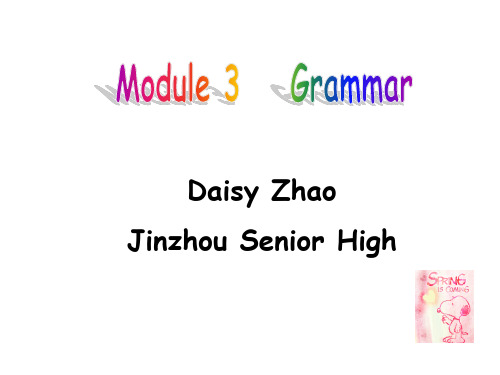
4)You, enter a house, you, take your shoes off
If you enter a house, you take your shoes off.
5) it, be sunny, she, fly a kite
If it is sunny, she will fly a kite.
Whoever = no matter who Whenever= no matter when However = no matter how Whichever = no matter which
Conclusion Ⅰ以上从属连词引导让步状语从句
Finish the exercises on P27
Too bad
• Peter wants to stay up late to watch a movie tonight, but he knows he shouldn’t. If he stays up late to watch a movie, he won’t get bed until after midnight. If he doesn’t get to bed until after midnight, he will probably be very tired in the morning. If he is very tired in the morning, he might oversleep. If he oversleeps, he will be late for work. If he is late for work, his boss might get angry and fire him. So, even though Peter wants to stay up late to watch a movie tonight, he isn’t going to. Too bad!
外研社高中英语必修四第三模块grammar 35张ppt

2020/5/26
14
(5)"no matter+疑问词"引导让步状语从句
"疑问词十ever"相当于"no matter+疑问词"引导的让步状语从句。
e.g. Whichever/No matter which book you borrow,you must return it in a
week.
Child as he is,the boy knows a lot. 尽管还是个孩子,但这男孩懂得很多。
Try as I might, I couldn't lift the stone. 尽管我试了,我还是举不起这块石头。 注意:在这种倒装结构中,也可以用though,但不用although。
e. g.Bravely though the players fought,they had no chance of winning.
2020/5/26
8
7.条件句中的虚拟与倒装 if引导的条件状语从句如果与事实不符,应用虚拟语气。 (1)与现在事实相反,主句用过去将来时,从句用一般过去时,be 动词 用复数形式。
e.g.If I were you,I wouldn't do it. 如果我是你,我就不会那样做。 (2)与过去事实相反,从句用过去完成时,主句谓语为 should/would/could/might have done。 e.g. If you had got up earlier,you would have caught the train.如果你早起 些,你就会赶上火车的。
你无论借哪本书,都必须一周内归还。
Whenever/No matter when you come back, don't wake me up.
高中英语 Module 3Grammar课件 外研必修4

but for若非, 要不是 But for the rain, we should have a pleasant journey. 要不是下雨, 我们的旅行肯定会很愉快。 But for your help, we should not have finished in time. 要不是你帮忙, 我们肯定不能及时完成任 务。
外研版 高一年级(必修4)
Module 3
Grammar 1 Adverbial clause of condition
Look at these sentences from the passage. If you say the word “communication”, most people think of words and sentences. We use “learned” body language when we are introduced to strangers. Now tick the true statements.
If I were you, I would invite him to the party. 如果我是你, 我会邀请他参加聚会。 I would have arrived much earlier if I had not been caught in the traffic. 如果没有堵车, 我会到的早一点儿。
1. Which sentences refers to a normal everyday situation?
2. Which sentences refers to a possibility in the future?
3. Which word in the third sentence mean inj.假如, 除非, 以……为条 件 provided (that) +从句表示一种假设条 件。
人教版高中英语必修四Unit3 Grammar 课件(共14张PPT)
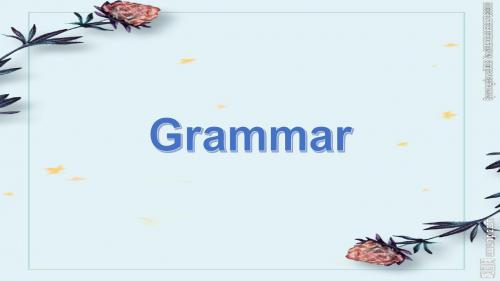
• 1、表示名词的属性、作用或用途。 • We are not allowed to speak aloud in the reading
一般式 完成式
主动语态 doing having done
被动语态 being done having been
done
现在分词 及物动词(write) 不及物动 词(go)
主动语态 被动语态 主动语态
一般式 writing being going written
完成式 having having having writing been gone written
• I saw a boy getting on the bus.(表示动作正在进行) • 我看见一个男孩在上公共汽车。 • I saw a boy get on the bus.(表示动作完成了) • 我看见一个男孩上了公共汽车。
2、表示指使意义的使役动词,常见的有:have、let、keep、 get、leave等。 • we kept the fire burning all night long. • 我们让火整夜燃烧着。
2、表示主语的某种性质和特征,这时通常可以看做形容词。
• The problem is quite puzzling. • 这个问题很令人困惑。 • The film we saw last night was very moving. • 我们昨天看的那部电影非常感人。
• 拓展:常用来做表语的现在分词有:astonshing、
- 1、下载文档前请自行甄别文档内容的完整性,平台不提供额外的编辑、内容补充、找答案等附加服务。
- 2、"仅部分预览"的文档,不可在线预览部分如存在完整性等问题,可反馈申请退款(可完整预览的文档不适用该条件!)。
- 3、如文档侵犯您的权益,请联系客服反馈,我们会尽快为您处理(人工客服工作时间:9:00-18:30)。
Though/Although he was worn out, (still) he kept on working. 虽然他已经精疲力竭, 但仍然继续工 作。 Though/Although he is very old, (yet) he is quite strong. 他虽然年纪大了, 身体还很健壮。
He won’t be against us in the meeting provided that we ask for his advice in advance. 如果我们提前征求一下他的意见, 他 就不会在会上反对我们。
另外还有in case, as/so long as In case it rains, do not expect me. 如若下雨, 就不要等我了。 As long as you promise to come, I’ll wait for you until you come. 只要你答应, 我就等你来。
Module3 Body Language and Non-verbal communication Grammar 1 Adverbial clause of condition
Look at these sentences from the passage. If you say the word “communication”, most people think of words and sentences. We use “learned” body language when we are introduced to strangers. Now tick the true statements.
7. —Are you thinking about going to New York for the holiday? —No. But if I ________the time,I would definitely go. A. have B. had B C. have had D. would have 8. If you ________this experiment,you will understand the theory better. A. will be doing B. have done B C. will have done D. would do
12. —The air is full of smoke and people are coughing. — It will get worse ________the government does something about the pollution. A. but B. B unless C. except D. if 13. I wonder if I________ time. If I ________time,I’ll go with you. A. have;have B. will have;will have C. have;will have D D. will have;have
4. What ____ ___ about shall I __ do if they talk
politics? (do, talk)
5. If you raise ____ your hand, the taxi
_______. will stop (raise, stop) 6. I __________ ____ will not say anything unless he asks me. (not say, ask)
Exercises
If I see her I’ll invite her to the party. (see, invite) 1. If you ____ will be take a cake, your host ______ very pleased. (take, be) 2. Unless the weather gets ___ better, I _______ will stay at home. (get, stay) 3. He _______ will go home early if he __________ doesn’t feel well. (go, not feel)
1. Which sentences refers to a normal everyday situation? 2. Which sentences refers to a possibility in the future? 3. Which word in the third sentence mean if …not? The key: 1.a 2. b 3. unless
其他的连词:
1. unless conj. 除非, 若不, 除非在……的时候 You will fail to arrive there in time unless you start earlier. 如果你不早点动身, 你就不能及时赶到那儿。 Unless it rains, the game will be played. 除 非下雨, 比赛将照常进行。
4. provided conj.假如, 除非, 以……为条 件 provided (that) +从句表示一种假设条 件。 He will sign the contract provided we offer more favorable terms. 如果我们提出更优惠的条件, 他就会在 合同上签字。
The sentences from the passage… 1. describe common situations. 2. describe impossible situations. 3. use if or when to introduce the situation. 4. explain the result of the situation in the other part of the sentence. 5. use the present simple tense in both parts of the sentence.
Байду номын сангаас
Find more examples of sentences with if or when in the passage.
The keys: 1) If our right hand is busy greeting someone, it cannot be holding a weapon. 2) If you shake hands with someone, you show you trust them.
9. The volleyball match will be put off if it ________. B rains A. will rain B. C. rained D. is raining
10. — Shall Brown come and play computer games? — No,________ he has finished his homework. A. when B. if C. C unless D. once 11. ________ you try, you will never succeed. A. If B. Until C. Since D. D Unless
Supposing it rains, shall we continue the sports meeting? 倘若下雨, 我们的运动会还要继续举行 吗? Supposing something should go wrong, what would you do then? 假如出了什么问题, 你准备怎么对付?
but for若非, 要不是 But for the rain, we should have a pleasant journey. 要不是下雨, 我们的旅行肯定会很愉快。 But for your help, we should not have finished in time. 要不是你帮忙, 我们肯定不能及时完成任 务。
If I were you, I would invite him to the party. 如果我是你, 我会邀请他参加聚会。 I would have arrived much earlier if I had not been caught in the traffic. 如果没有堵车, 我会到的早一点儿。
Grammar 2 Adverbial clause of concession
(1) though, although表示“虽然, 纵然” 之意。 这两个连词意思大致相同,在一般情 况下可以互换使用。在口语中, though 较常使用, although比though 正式,二者都可与yet, still或 nevertheless连用, 但不能与but连用。
从上述例句可以看出if, unless, on condition (that), supposing, provided等 词引导的条件状语从句, 主从句条件关 系分明, 结构清晰。 在条件状语从句中, 用一般现在时代替 一般将来时, 一般过去时代替过去将来 时。
但有些句子, 虽没有含条件关系的连词, 却也隐含着条件关系, 这些句子常用一 些词, 如but for, without等引出一个介 词结构来表示条件, 条件常常是虚拟的, 或与事实相反的假设。如:
我们知道, 引导条件状语从句最常用的 连词是if, 由if引导的条件状语从句表示 在某种条件下某事很可能发生。如: 如果你请他帮忙, 他会帮你的。 If you ask him, he will help you.
If you fail in the exam, you will let him down. 如果你考试不及格, 你会让他失望的。 另外, if从句还表示不可实现的条件或 根本不可能存在的条件, 也就是一种虚 拟的条件或假设, 从句多用一般过去时 或过去完成时。如:
